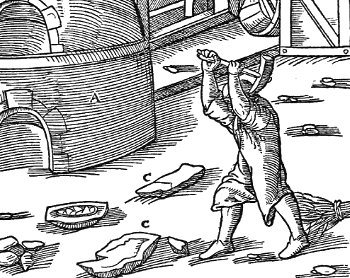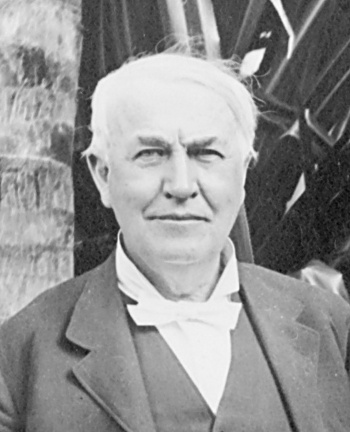
Work
September 3, 2012 A quantity called "work" is defined in mechanics, and it's a good day to review work, since today is the Labor Day holiday in the United States. Labor day occurs on the first Monday in September, and it was established as a holiday in the United States by an Act of Congress in 1894. Before I review the mechanical concept of work, I have a short rant that's the perogative of age. The wealth of the United States was built by the labor of people of many races and ethnicities. The US labor movement established a mighty middle class in this country that shared in its industrial wealth. Lately, the labor movement has been under siege, and so has the middle class. Now, there's a growing gap between the lower and upper income classes. The last decade was a period of economic decline, but the pain was not shared equally. According to a recent Pew Research Center study,[1] the median wealth of the middle class, which is their assets minus debt, declined by 28% from 2000-2010, and the median wealth of the lower-income tier declined by 45%. In this same period, the wealth of the upper-income tier was essentially unchanged. As an avid science fiction fan, I'm reminded of a particular dystopia presented in the original Star Trek series. The episode, The Cloud Minders (Season 3, Episode 21, first aired February 28, 1969), takes place on the planet, Ardana, in which there is a class division between a laboring class that works in dangerous mines, and an elite who live in luxury in a city floating in the air. Kirk, with his proper American middle-class values, sees this as an abomination, and he works to establish class equality on the planet. That was a snapshot of American values in 1969, so much changed at present. Now I'll leave the distopian world of politics and economics and return to the well-ordered world of science. | Work, before the invention of cubicles. Cropped illustration from De Re Metallica (1556), Book XII, by Georgius Agricola. The worker is tending a glass melting furnace. (Via Wikimedia Commons). |
W = F•dThe dot product, as is usual in such mechanical equations, indicates that we're only interested in the component of force that's applied in the direction of travel. If you look at the dimensions of work, you see that it has units of energy; viz., (kg-m/sec2)(m) = (kg)(m/sec)2. Unlike other physical quantities, such as action, which have an air of mystery, work makes a lot of sense. Pulling a suitcase up two flights of stairs requires twice the work needed to pull it up just a single flight. Laplace alluded to work in his description of tidal forces in 1778, but Sadi Carnot gave an explicit expression of work as it applies to lifting against gravity. In his most famous work, "Reflections on the Motive Power of Fire (1824)," Carnot defined work as "weight lifted through a height." The definition, as given in English translation on Wikipedia, is as follows:
"We use here motive power (work) to express the useful effect that a motor is capable of producing. This effect can always be likened to the elevation of a weight to a certain height. It has, as we know, as a measure, the product of the weight multiplied by the height to which it is raised."[2,3]Gaspard-Gustave Coriolis (the same Coriolis as in the Coriolis Effect) gave the formal definition of work, as expressed in the force times distance equation, in 1835. One important thing to remember is that movement is required for work. You need to exert the force over the distance d. You can push on your car to get it out of that snowbank; but, if it doesn't move, you haven't done any work. When I was an undergraduate student, one of my professors told us that all of mechanics is just F=ma. The trick, however, is to understand what F, m and a are in every problem. In thermodynamics, work is the product of pressure and a volume change; that is, ∂W = p∂V. An electric charge moving in an electric field (or a magnetic field) experiences a force, so it's possible to define electrical work. One exemplar of the American work ethic is Thomas Edison. Although Edison was a member of the moneyed elite in his later years, he had to work to attain his wealth, unlike many of his contemporaries. Here are two Edison quotations most appropriate for Labor Day.[4]
"Genius is one percent inspiration and ninety-nine percent perspiration."
"Opportunity is missed by most because it is dressed in overalls and looks like work."
 | Thomas Edison outside his Ft. Myers, Florida, home, March 16, 1914. I wrote about Edison in quite a few previous articles (Edison's Nickel-Iron Battery Modernized, July 9, 2012, "His Master's Voice," August 15, 2011, "People Who Live in Concrete Houses...," June 30, 2011, and "Edison's Iron Mine," September 20, 2010). (United States Library of Congress image, cropped, via Wikimedia Commons). |
"I'm a great believer in luck and I find the harder I work, the more I have of it." (Thomas Jefferson)[5]
"The society which scorns excellence in plumbing because plumbing is a humble activity, and tolerates shoddiness in philosophy because philosophy is an exalted activity, will have neither good plumbing nor good philosophy. Neither its pipes nor its theories will hold water." (John W. Gardner)[6]
References:
- The Lost Decade of the Middle Class - Fewer, Poorer, Gloomier, Pew Research Center Report, August 22, 2012.
- Work (thermodynamics) Page on Wikipedia.
- Sadi Carnot, "Réflexions sur la puissance motrice du feu et sur les machines propres à développer cette puissance," Gauthier-Villars (Paris, 1878), 102 pages, via Google Books.
- Thomas Edison Quotations on Wikiquote.
- Thomas Jefferson quotations on Wikiquote.
- John W. Gardner quotations on Wikiquote.
- Work (thermodynamics) Page on Wikipedia.